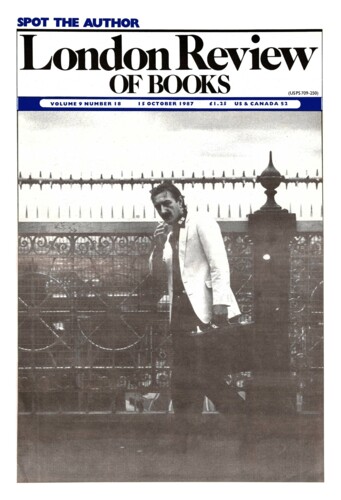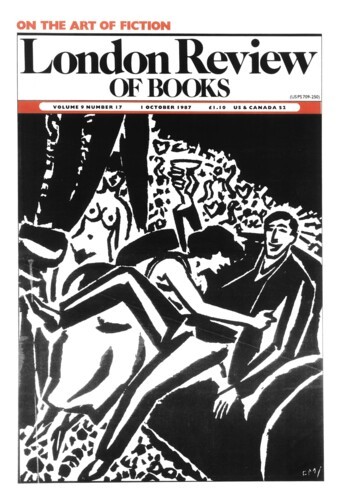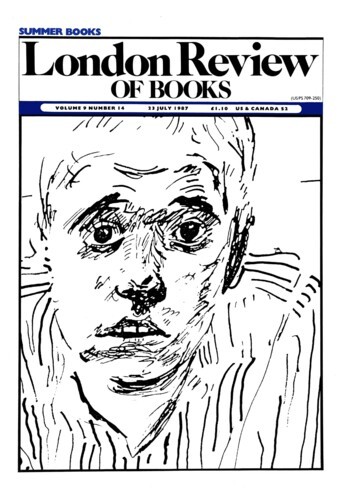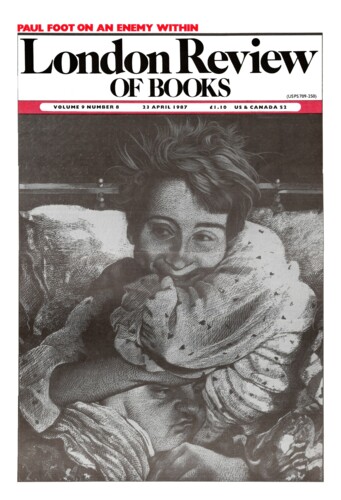D.A.N. Jones
D.A.N. Jones was a literary journalist who wrote more than sixty pieces for the LRB. Mary-Kay Wilmers wrote after his death in 2002 that Jones ‘presented himself as a plain man . . . but he was also more interesting and cagier than that’.
Powerful People
D.A.N. Jones, 15 October 1987
Chinua Achebe’s masterly novel concerns three powerful Africans. They are drawn on the dust-cover as three green bottles, from the English song: ‘If one green bottle should accident’ly fall …’ One is the President of an African state, generally known as His Excellency, though his old schoolmates remember him as Sam. Another is Ikem Osidi, editor of the National Gazette, a fiery journalist and admired poet. At school, Ikem was considered ‘the brightest’, but Sam was the cricket captain and the ‘social paragon’. Sam went to Sandhurst and achieved the Presidency through a military coup. The third schoolfellow holds a rank midway between Ikem and His Excellency. This is Chris Oriko, former editor of the National Gazette, now promoted as the Honourable Commissioner for information, meeting His Excellency frequently and sometimes being ordered to pass on instructions to the recalcitrant Ikem. The three have known one another for twenty-five years, from the day when they ‘first met as new boys of 13 or 14 at Lord Lugard College’. Nigeria is suggested by the name of Lugard, but Achebe has set his story in an imaginary state, called Kangan, smaller than Nigeria. There is a general feeling that these three schoolfellows ought not to be working closely together, resenting one another. Lord Lugard boys should be lonely leaders, living in isolation like District Commissioners, educating or governing the common people.
Mountain Novel, Hitler Novel
D.A.N. Jones, 1 October 1987
The first thing to notice about The Spell is that it is a good, readable story. Hermann Broch is considered ‘very hard to read’, wrote Martin Seymour-Smith in his useful guide, Novels and Novelists. ‘He used most of the Modernist technical devices available to him, but mainly stream of consciousness.’ Broch’s work has often attracted comments like that and they sound, to the general reader, like the kiss of death. Nevertheless, The Spell is as straightforwardly readable – and haunting – as the stories of Walter De La Mare, say, or as Emily Brontë. Secondly, it is a reflection on the largest public event in Broch’s life – the takeover of Germany and Austria by the Nazis, heralding their attempt to conquer the world, using ‘crowd-psychology’. Thirdly, it is uncompleted, though it may not seem incomplete. Broch worked on it for almost twenty years, while completing other work. More than one version of The Spell has been published. One of them is called The Tempter.’
Bright Old Thing
D.A.N. Jones, 23 July 1987
Conrad Russell was a nephew of the ninth Duke of Bedford: every publisher in Great Russell Street and Bedford Square must have wanted to publish his selected letters, if only from simple loyalty to the landowner. Russell’s life was not remarkable, on the surface. Evelyn Waugh said he was ‘exquisitely entertaining’, but this is ambiguous: he may have meant that Russell was a figure of fun, like William Boot. When Russell died in 1947 he was described in the Times as ‘that most endearing of Somerset farmers’ – the best tribute they could come up with. Russell was ever a countryman, proud of his mangels: raised in rural Surrey, he was discomposed in towns. He wrote to his sister in 1902 when he was 24: ‘I have never found London life so unattractive before. The young men at Scoones do not amuse me much but I seem to amuse them for they laugh consumedly every time I open my mouth. I think it is because my voice is different from theirs.’ Worse was to come. In 1937 he wrote to Diana Cooper about a member of his London club who had raised an objection about Russell ‘talking farming’. The complaint ran: ‘It’s really unbearable. I sometimes think I’ll scream, it suffocates me.’ Russell concedes: ‘Well, you never see yourself as others see you. I’m THE club bore and never knew it.’’
Vies de Bohème
D.A.N. Jones, 23 April 1987
For almost forty years Nadine Gordimer has been publishing gallant and sensitive stories deploring the apartheid system in her native South Africa. Every book is received with respectful, almost ritual lamentations by London reviewers, reminded of the days of their youth – for the apartheid regime has a longer history than Nazi Germany or even Franco’s Spain. One cannot admit to being bored with the problem but may wonder what else there is to say. In A Sport of Nature Miss Gordimer breaks out of the enclave with a novel about a Jewish girl who makes love to black Africans, travels around the world and returns to her homeland, ‘the new African state that used to be South Africa’, as the wife of the Chairman of the OAU (the Organisation of African Unity). This is an optimistic conclusion, perhaps a pipe-dream. The story is told in a rather hazy way, often as if a biographer was seeking to establish facts about a well-known person with mysterious gaps in her history, sometimes breaking into italics with gnomic utterances: ‘Winter is burial … What has been, what was, what will be: nobody else can decide … ’ Sometimes we are unsure what country Hillela, the heroine, is in. She does not talk much and she feels like a fantasy figure. Only the scenes in white-ruled South Africa are presented naturalistically. The lusus naturae of the title seems to be Hillela, not apartheid.’
Read anywhere with the London Review of Books app, available now from the App Store for Apple devices, Google Play for Android devices and Amazon for your Kindle Fire.
Sign up to our newsletter
For highlights from the latest issue, our archive and the blog, as well as news, events and exclusive promotions.




